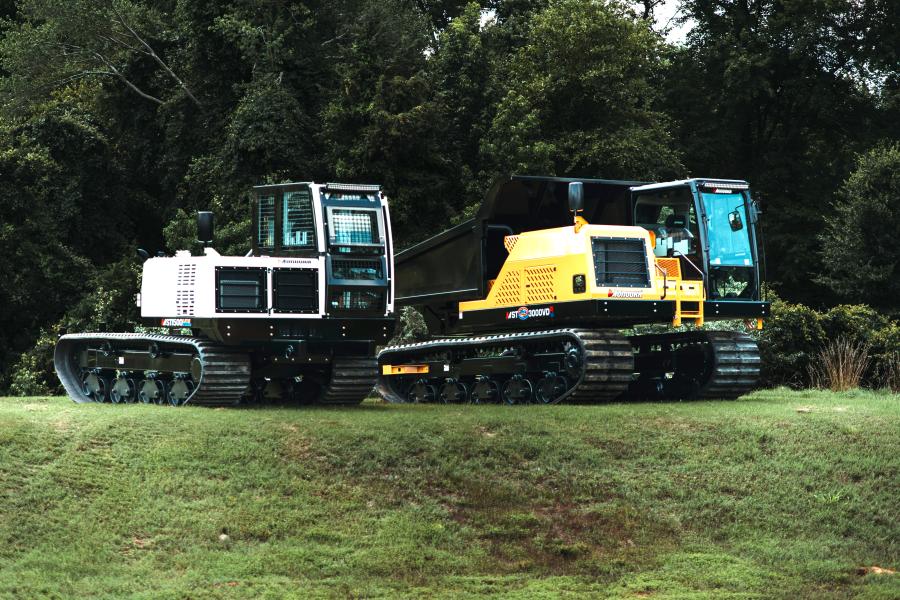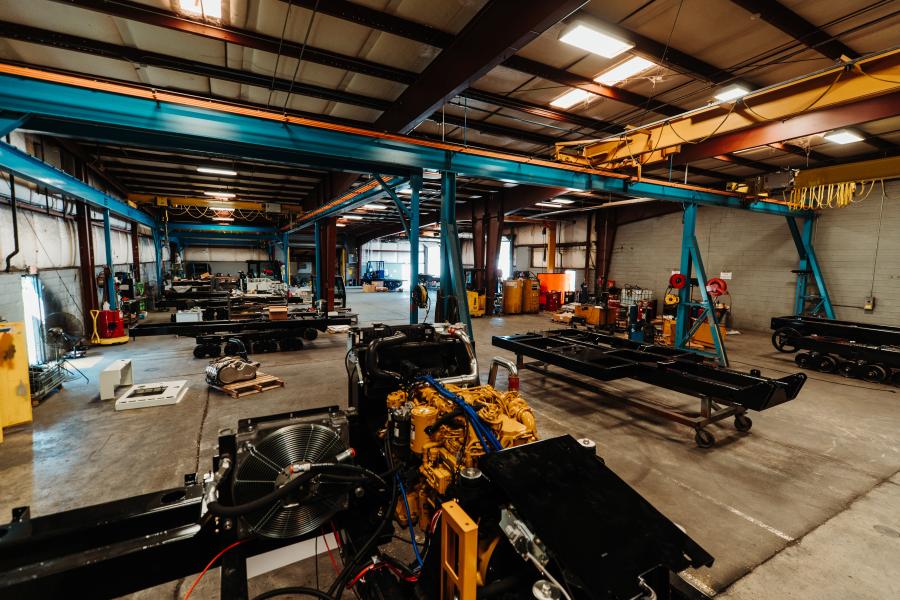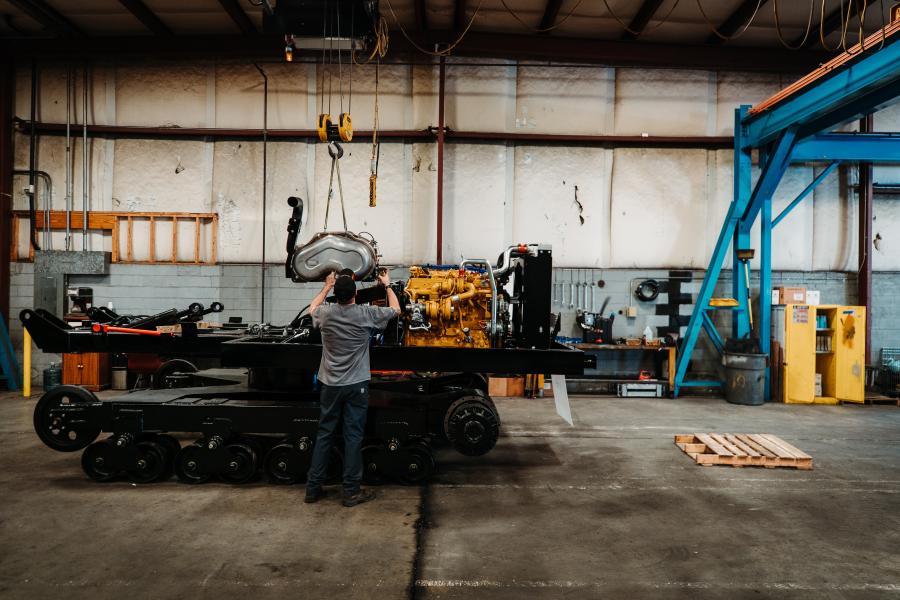The Morooka MST-1500VDL and MST-3000VDR.
(Morooka USA photo)
In recent years, the demand among contractors for more compact construction equipment has increased dramatically in the United States, with no signs of slowing down.
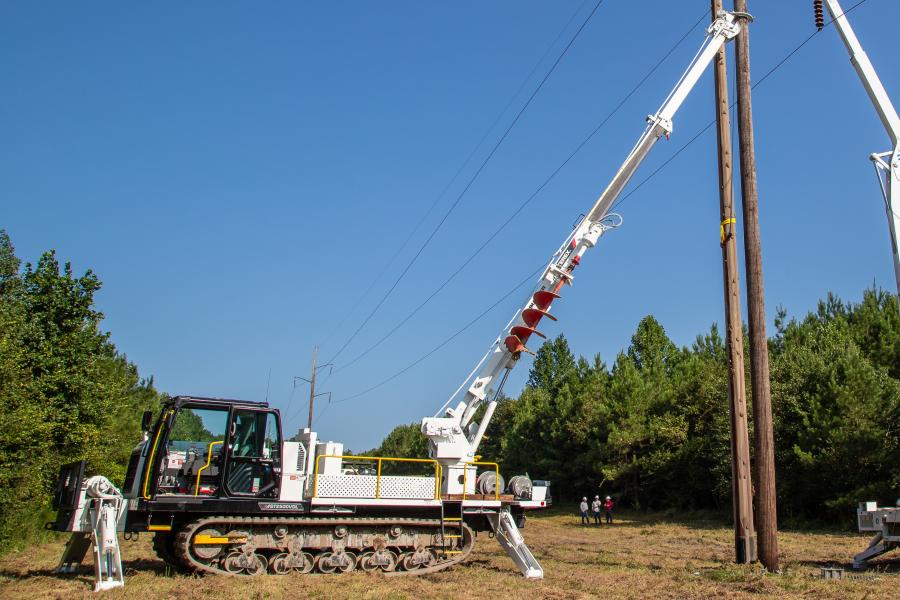
The Morooka MST-2500VDL
As part of that market expansion, builders and machine operators also have discovered how well a line of smaller, more maneuverable rubber-track carriers can bring more efficiency to their job sites, while also combining better traction with a high load capacity.
One of the trailblazers in bringing these types of versatile equipment to market in North America is Morooka USA, a master distributor of Japan's Morooka Co Ltd. The U.S. distributor, based in Ashland, Va., just north of Richmond, supplies its versatile machines to approximately 150 dealers across the United States and Canada.
A related company, Morooka America LLC, owned by the Japanese conglomerate, serves as the exclusive American manufacturing plant for the rubber-track carriers, and also is located in Ashland. The more than 80,000-sq.-ft. factory makes 16 Morooka products, including various-sized utility machines and rotators, as well as rubber-track carriers with HST hydraulic systems. The facility builds approximately 300 machines a year.
Morooka Finds Perfect American Partners
After Morooka had imported its machines to United States for many years, by the early 2000s, its Japanese leadership realized that distribution efforts in America were not performing to the level that they had hoped.
At the same time, a pair of brothers, Ronnie and Kenneth Byrd, were running Wakita Distribution, a construction equipment parts warehouse started in 1998 in the Richmond area.
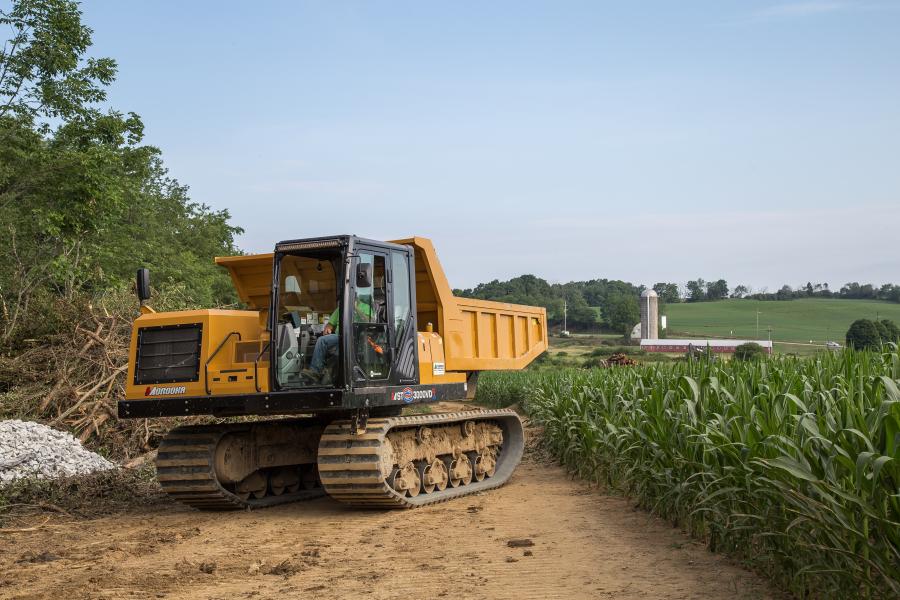
The Morooka MST-3000VDR.
"When we were operating Wakita, we found a niche in supplying used Yanmar equipment parts to the U.S. market, and that led us to Morooka," said Ken Byrd. "At that time, most machines in the country were imported from Japan used, so there was an almost immediate need for parts for that equipment. Morooka was aware of our success with Yanmar, so they asked us to distribute their products here in the U.S. as a master distributor and we signed an agreement with the company in 2003."
In the early days of the collaboration with Morooka, Ken Byrd, now president of Morooka USA, said they slowly built the dealership network from scratch.
"It was a clean slate for us to develop the U.S market because we had no dealers in the beginning," he said. "Between 2005 and 2009, we had the territory east of the Mississippi River and Morooka controlled everything to the west through its Portland, Ore., office."
After Morooka Japan had reached the point where it was confident in the Byrds' ability to build a dealer network, the overseas equipment manufacturer struck another deal with the Virginia-based company to build product close to Morooka USA's operations. The Japanese conglomerate later decided to run the Morooka America factory itself in 2019.
Product Lines Built to Be Adaptable
During its early years as a distributor, Ken and his partners, Ronnie Byrd and Yoshi Tanaka, learned that the pipeline industry could be an excellent market for Morooka products, leading them to target and obtain their first dealers and customers from pipeline installation companies in the South.
Morooka carriers also are easily adaptable to multiple segments of the construction industry beyond pipeline work. Its machines can add cabs to the trailers, attach different rigs to the beds, or remove the beds entirely to suit any type of project.
Early on, Byrd said, Morooka USA exclusively represented Morooka's dump carrier line, with the flatbed being the only option available to customers.
"Along the way there would be the occasional contractor who wanted to do something different with our standard machine and as long as he could mount it to a flatbed or to the back of a machine on its own platform, he could do what he wanted with his Morooka," he said. "Our early successes at offering products that could be more versatile came about when the pipeline industry began adapting our traditional flatbeds to mount small core drilling, sandblast and welding rigs for on-site use.
"Later, in 2012, we saw a real need to make our machines more customizable when we wanted to become a player in the utility industry," he added. "The various OEMs that we do business with today were frustrated at that time with the carrier makers that would only offer one machine, one size and one style. We took a different approach to that and, rather than say, ‘We have one machine; it has to fit your need,' we decided to work with these manufacturers by building custom frames and mounting options to fit what they needed. I think some of our competitors are now following our lead and trying to do the same thing."
Now, Byrd said, Morooka products are excellent rental machines for their dealers, adding "the return on investment from the dealers' perspective has been they are about the best in their fleets, making them a very attractive addition to their equipment lineup."
Machines Designed to Work in Challenging Environments
The middle of the Morooka product line, according to Byrd, has the maker's current best-selling models, with carrying capacities of between 24,000 lbs. to 35,000 lbs. — what he calls "the strength of our entire line." Among that group are the Morooka MST-1500VD rubber-track and utility carriers, and the MST-2200VD rubber-track model, all made in the Virginia facility, and noted for offering low ground pressure and perfect for working off-road in more boggy areas.
"Their undercarriages use a floating bogie system that distributes the weight of the load across the entire track and the total ground pressure," he said.
The manufacturer also builds a rotator model, the Morooka MST-700VDR, a cutting-edge rotating dump carrier built with reliability and durability in mind. The machine has proven to be ideal for transporting loads across rough terrain and challenging environments.
Additionally, the MST-700VDR features a powerful rotating system that allows the operator to easily maneuver in tight spaces.
"The top structure rotates 360 degrees independently from the tracks so you can pull into a spot, turn the top around, dump your load, and drive out without moving the tracks and disturbing the ground further," said Ken Byrd's son, David, Morooka USA's marketing manager, who also handles social media and trade show logistics for the company.
"And the MST-700VDR does provide another level of safety on the job site because the operator never has to back up," Ken Byrd added. "We were among the first manufacturers of track carriers to put cameras in them to help the operators see what they were doing."
Speedy New Compact Carrier Being Developed
Soon, Morooka will be bringing an exciting new machine to market that David Byrd described as one that its dealers and customers have been requesting. A prototype of the new model was unveiled earlier this year at ConExpo in Las Vegas.
"The MHS1300 High Speed compact carrier has a two-man cab that customers have been asking about and wanting for years," he said. "It also travels more than twice as fast as your standard Morooka with a top speed of about 17 mph, as opposed to 7 mph."
The advantage of a higher speed on a rubber track carrier is simple: the ability to traverse big job sites more quickly.
"When you get out there in one of these machines and you have a mile or two to cover on a big flat job site, it gets tiring doing that repeatedly," David Byrd added. "If, on the other hand, you can do that job two-and-a-half times quicker, you are going to be much more efficient."
The diesel MHS1300, with a Cat-built engine, will offer a relatively small payload of about 4,000 lbs., but the simplicity of what it will be asked to do — and in a more rapid amount of time — should make it attractive to buyers and renters.
"The nice thing about Morooka is that its machines are simple," said Ken Byrd. "They have diesel engines made by two manufacturers, Kubota, and Cat, for our U.S. models, plus they have hydraulics and undercarriages, so there is nothing unique about them from a service standpoint."
Building Morookas Stateside Gets Them to Customers Quicker
The need to build Morooka carriers in the United States, rather than relying on imports from Japan, he said, was to have enough available inventory on hand for the North American market, particularly as the demand for compact equipment shows no signs of diminishing.
"Another advantage to having Morooka products built here rather than in Japan is that it gets them into the U.S. and Canadian dealerships more quickly," he said. "It only takes about two weeks to build a Morooka, but if it comes from Asia, it ends up spending 30 days at sea, and the shipping cost is higher."
David Byrd added, "Building the equipment here is also what has allowed us to dive so deeply into the utility market. We have been able to work closely with the OEMs to make changes on the fly when it comes to customization and getting it exactly right for whatever attachments are going on the back of our products."
Key Contributors to Morooka USA's Success
The success the Byrd family has enjoyed over the past 25 years in growing from a small parts distribution outfit into a master distributor for a Japanese equipment manufacturer, complete with an expansive North American dealership base and a Virginia factory, is due in large measure to two other people, as well.
"My other brother, Ronnie, is the managing member of the holding company that owns Morooka USA and Morooka Rents, a small rental outfit that supplies product to our dealers for re-rents whenever either their fleets are maxed out or they do not have a specific size available. He is actively involved in that business," Ken Byrd said.
"Ronnie is the reason that we have any of the relationships we have with Japan. In the 1980s, he began going over there to bring in used equipment for refurbishing and resale through either an auction or dealer network in the U.S. He also had strong ties with many Japanese companies and had connections to both Morooka and Hitachi."
In addition, a third partner to Ken and Ronnie Byrd is Yoshi Tanaka, an American citizen born in Kyoto, Japan, who came to this country when he was 20 years old.
"He is now in his seventies, but he is vital to Morooka USA because he knows the business acumen and culture of Japan," Ken Byrd said. "He was able to make introductions and often lead us onto the correct path in many of the negotiations we had with several Japanese companies over the years, including Morooka. Mr. Tanaka has been an important part of the operations here behind the scenes and key to our discussions and open lines of communication with Morooka Japan."
For more information, visit www.morookacarriers.com. CEG
Eric Olson
A writer and contributing editor for CEG since 2008, Eric Olson has worked in the business for more than 40 years.
Olson grew up in the small town of Lenoir, NC in the foothills of the Blue Ridge Mountains, where he began covering sports for the local newspaper at age 18. He continued to do that for several other dailies in the area while in college at Appalachian State University. Following his graduation, he moved on to gain experience at two other publications before becoming a real estate and special features writer and editor at the Winston-Salem Journal for 10 years. Since 1999 he has worked as a corporate media liaison and freelance writer, in addition to his time at CEG.
He and his wife, Tara, have been married for 33 years and are the parents of two grown and successful daughters. His hobbies include collecting history books, watching his beloved Green Bay Packers and caring for his three dogs and one cat.
Read more from Eric Olson here.
Today's top stories



